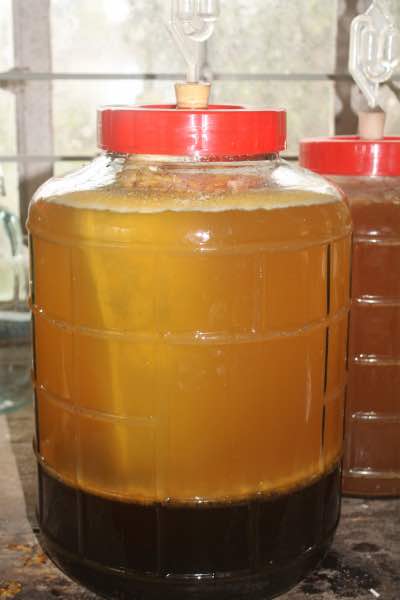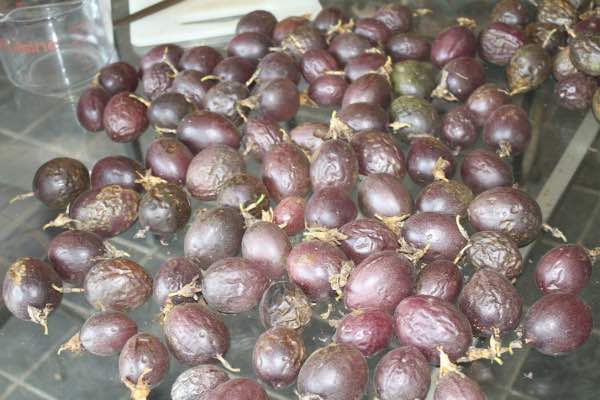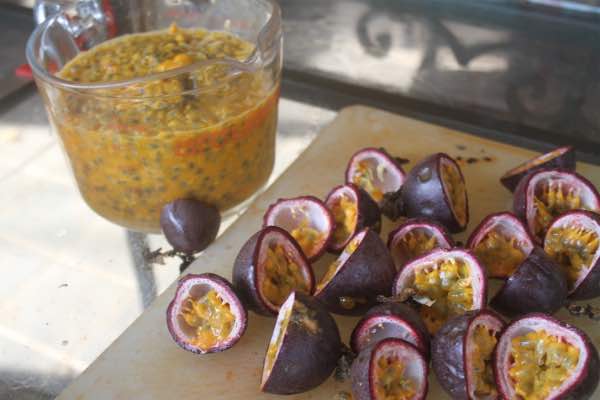- Homepage
- Honey Mead
- Ferment a Passionfruit Melomel
Ferment a passionfruit melomel
Ferment a passionfruit melomel with raw, unheated honey for a delicious aperatief; it's also an excellent probiotic[1] that may evade the alcohol causes cancer link.
The pleasures of home brewing are returning to those who love their alcohol and have the desire to heed the strong research about the risks associated with commercial booze. This passionfruit melomel combines the benefits of raw fruit and natural unprocessed honey; it tastes fantastic too.
Fermenting honey with various fruits, herbs and spices goes back into the mists of time; whilst it is traditionally associated with the Vikings, many other cultures including the Bushmen of Southern Africa practised it too.
 Undissolved honey at the bottom and outline of the bag containing the fruit and spices
Undissolved honey at the bottom and outline of the bag containing the fruit and spicesIt's granadilla season
We advise on fermenting whatever is in season; right now it's granadilla season. Also known as passionfruit, this vitamin and phytonutrient-rich pod has incredibly delicious flavour.
 Ferment a melomel when you have a glut of fruit
Ferment a melomel when you have a glut of fruitBasic equipment
To become a brewer some basic equipment is needed for the more complex meads; you have to keep oxygen out or there is risk of it turning to vinegar. Because of some anxiety about the nanoparticles associated with plastic we advocate only using glass. A demijohn at the very least is recommended; preferably a wide-mouthed carboy too.
Ferment a passionfruit melomel
Ferment a passionfruit melomel using fresh granadillas or the juice.
Ingredients
Granadillas
Raw honey
Loose black tea
Cloves
Cinnamon
Peppadews
Boiled rainwater
5L
15
1.8kg
1 tsp
2
1 stick
1
8L
20
2.9kg
1.5
3
1.5 sticks
1.5
23L
60
8kg
5
9
4
5

You can use commercial pasteurised granadilla juice.
The material expressed on this page is gleaned from the nutritional and environmental literature; it is clearly referenced. A plain distinction is made between the author's opinion and that which is scientifically proven. When in doubt consult your health professional.
To suggest a correction or clarification, write to Dr Bernard Preston here. Contact.
Go for it: there are 3 stages
Stage 1
- Sanitise the carboy with sterilising powder; rinse thoroughly.
- Brew the loose tea in a pot in the usual way.
- Measure out the honey and pour into the carboy; add an equal measure of the sterilized rainwater. Fasten the lid tightly.
- Rock the carboy for a full ten minutes to completely aerate the liquid; the yeast will thrive far more quickly, reducing the risk of an acetobacter infection.
- Add the pulp, spices and a few sterilised river stones to the bag to weight it down; knot it lightly and lower it gently into the carboy. The pebbles could crack the glass bottom. Pour in the filtered tea.
- Pour in more rainwater, leaving a gap of least 5cm so you don't have a flood should there be a strong ferment.
- Measure the pH; it should be around 4. Taste a small sample.
- If all the honey has dissolved then measure the initial SG if you want to know the exact strength of your final passionfruit melomel.
- Hydrate 1/2tsp of dried wine yeast (I use Vin13) in warm water and add after 20 minutes. A small piece of honey comb with fresh pollen will help provide nutrients.
- Tighten the lid and fit the air trap. Fermentation should start within 24 hours.
Stage 2
- Once it is clear that the vigorous fermentation is over, fill the carboy to within 2 cm of the top, the so-called "ullage."
- Check that the pH is still around 4.
- Refit the air-trap; keep in a cool dark place.
Stage 3
- After about 6 weeks from the start of fermentation, the period is not critical, again test the pH and taste your raw passionfruit melomel; it will be rather "rough."
- Using an auto-syphon, rack off the liquid into demijohns leaving as much of the sediment behind as possible.
- Fermentation is likely still continuing albeit at a much slower rate; it's best not to seal with a tight stopper. You could have an explosion.
- Retain that sediment in a "sludge bottle." Keep adding to it when you brew your next carboy or are racking off into demijohns. Rack off the clear mead blend after a month or two; it's often excellent.
- After about six months if the mead has cleared you can bottle your passionfruit melomel. But in fact you can start drinking it when still cloudy; it's a rich probiotic with the active yeasts.
nano-particles of plastic in teabags
Disturbing research from McGill university reveals that teabags release literally billions of tiny particles of plastic into each cuppa; if absorbed in the gut they can cross the blood-brain barrier.
Research reveals that those suffering from dementia have ten times as much plastic in their brains.
In any case a cuppa made from loose tea tastes so much better. There is the little fag of disposing of the leaves in the pot. That is small beer in comparison with the increased risk of getting Alzheimer's Disease; 11% of Americans over the age of 65[2].
Is there risk of mead causing cancer?
There is unfortunately certainly some risk of mead causing cancer as with all alcohol. However we believe there is an escape clause. Those living in the Blue Zones of the world where longevity is the keyword, drink quite large amounts of locally brewed wines and beers made from local organic ingredients; and free of sulphite preservatives.
But it's no guarantee; 17,000 new cases of cancer directly attributed to alcohol are diagnosed every year in the UK. That is pretty sobering.
Beta-carotene, vitamin C and other antioxidants
Passionfruit is remarkably high in antioxidants like vitamin C and beta-carotene; these compounds enhance our immune systems and protect us against the free radicals that damage our genes and cause cancer[3].
Preserving fruits, herbs and spices using the honey in mead makes it far easier to achieve the important target of at least 7 different coloured foods every day; even small quantities count[4].
Blue zones
There are five regions on Mother Earth where living to a vigorous and busy ninety is enhanced by an astonishing ten fold. Mead is huge at one of them, the island of Ikaria.
SUMMARY
- Fermenting a passionfruit melomel means we can enjoy alcohol with lessened and perhaps no risk of increased susceptibility to cancer; in fact it may enhance our protection. Much remains to be researched and proven.
- Hobbies that connect us with Mother Earth rather than Artificial Intelligence, social media and Commercial Alcohol are not only fun but also healthful; they are an essential part of Blue Zone Longevity.
When browsing use right click and "Open Link in New Tab" or you may get a bad gateway signal.
Newsletter
Our newsletter is entitled "create a cyan zone" at your home, preserving both yourself and Mother Earth for future generations; and the family too, of course. We promise not to spam you with daily emails promoting various products. You may get an occasional nudge to buy one of my books.
Here are the back issues.
- Lifestyle and ideal body weight
- What are ultra-processed foods?
- Investing in long-term health
- Diseases from plastic exposure
- Intensive lifestyle management for obesity has limited value
- A world largely devoid of Parkinson's Disease
- The impact of friendly bacteria in the tum on the prevention of cancer
- There's a hole in the bucket
- Everyone is talking about weight loss drugs
- Pull the sweet tooth
- If you suffer from heartburn plant a susu
- Refined maize meal and stunting
- Should agriculture and industry get priority for water and electricity?
- Nature is calling
- Mill your own flour
- Bake your own sourdough bread
- Microplastics from our water
- Alternative types of water storage
- Wear your clothes out
- Comfort foods
- Create a bee-friendly environment
- Go to bed slightly hungry
- Keep bees
- Blue zone folk are religious
- Reduce plastic waste
- Family is important
- What can go in compost?
- Grow broad beans for longevity
- Harvest and store sunshine
- Blue zone exercise
- Harvest and store your rainwater
- Create a cyan zone at your home
Did you find this page interesting? How about forwarding it to a friendly book or food junkie? Better still, a social media tick would help.
- Homepage
- Honey Mead
- Ferment a Passionfruit Melomel
Address:
56 Groenekloof Rd,
Hilton, KZN
South Africa
Website:
https://www.bernard-preston.com